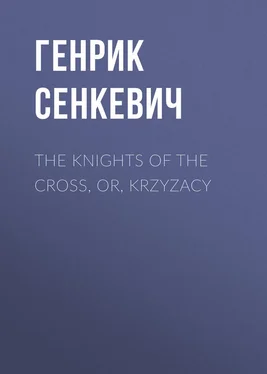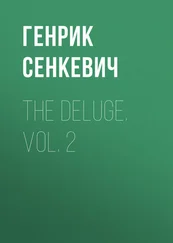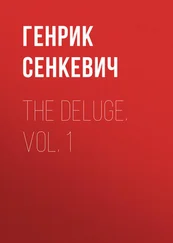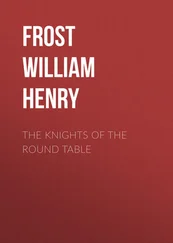Генрик Сенкевич - The Knights of the Cross, or, Krzyzacy
Здесь есть возможность читать онлайн «Генрик Сенкевич - The Knights of the Cross, or, Krzyzacy» — ознакомительный отрывок электронной книги совершенно бесплатно, а после прочтения отрывка купить полную версию. В некоторых случаях можно слушать аудио, скачать через торрент в формате fb2 и присутствует краткое содержание. Жанр: foreign_antique, foreign_prose, на английском языке. Описание произведения, (предисловие) а так же отзывы посетителей доступны на портале библиотеки ЛибКат.
- Название:The Knights of the Cross, or, Krzyzacy
- Автор:
- Жанр:
- Год:неизвестен
- ISBN:нет данных
- Рейтинг книги:4 / 5. Голосов: 1
-
Избранное:Добавить в избранное
- Отзывы:
-
Ваша оценка:
- 80
- 1
- 2
- 3
- 4
- 5
The Knights of the Cross, or, Krzyzacy: краткое содержание, описание и аннотация
Предлагаем к чтению аннотацию, описание, краткое содержание или предисловие (зависит от того, что написал сам автор книги «The Knights of the Cross, or, Krzyzacy»). Если вы не нашли необходимую информацию о книге — напишите в комментариях, мы постараемся отыскать её.
The Knights of the Cross, or, Krzyzacy — читать онлайн ознакомительный отрывок
Ниже представлен текст книги, разбитый по страницам. Система сохранения места последней прочитанной страницы, позволяет с удобством читать онлайн бесплатно книгу «The Knights of the Cross, or, Krzyzacy», без необходимости каждый раз заново искать на чём Вы остановились. Поставьте закладку, и сможете в любой момент перейти на страницу, на которой закончили чтение.
Интервал:
Закладка:
They stepped aside without any resistance. The men with halberds entered first, and were followed by Zbyszko, accompanied by the priest and the clerk of the court. At that moment something happened which nobody had expected. From among the knights, Powala stepped forward with Danusia in his arms and shouted: "Stop!" with such a powerful voice, that the retinue stopped at once, as if rooted to the ground. Neither the captain, nor any of the soldiers dared to oppose the lord and knight, whom they were accustomed to see every day in the castle and often in confidential conversation with the king. Finally, other knights, equally distinguished, also began to shout with commanding voices:
"Stop! Stop!" In the meantime, the Pan of Taczew approached Zbyszko and handed Danusia to him.
Zbyszko caught her in his arms and pressed her to his chest, bidding her farewell; but Danusia instead of nestling to him and embracing him, immediately took her white veil from her head and wrapped it around Zbyszko's head, and began to cry in her tearful, childish voice:
"He is mine! He is mine!"
"He is hers!" shouted the powerful voices of the knights. "To the castellan!"
A shout, like the roar of thunder, answered: "To the castellan! To the castellan!" The priest raised his eyes, the clerk looked confused, the captain and his soldiers dropped their arms; everybody understood what had happened.
There was an old Polish and Slavonic custom, as strong as the law, known in Podhale, around Krakow, and even further. If a young girl threw her veil on a man conducted to death, as a sign that she wished to marry him, by so doing she saved his life. The knights, farmers, villagers and townsmen all knew this custom; and the Germans living in the old cities and towns, had heard about it. The old man, Macko, almost fainted with emotion; the knights having pushed away the guards, surrounded Zbyszko and Danusia; the joyful people shouted again and again: "To the castellan! To the castellan!"
The crowd moved suddenly, like the waves of the sea. The executioner and his assistants rushed down from the scaffold. Everybody understood that if Jasko of Tenczyn resisted the custom, there would be a riot in the city. In fact the people now rushed to the scaffold. In the twinkling of an eye, they pulled off the cloth and tore it into pieces; then the beams and planks, pulled by strong arms, or cut with axes, began to crack, then a crash, and a few moments later there was not a trace left of the scaffold.
Zbyszko, holding Danusia in his arms, was going to the castle, but this time like a true victor, – triumphant. With him were marching joyfully the most noted knights in the kingdom; thousands of men, women and children were shouting and singing, stretching their arms toward Danusia and praising the beauty and courage of both. At the windows the townswomen were clasping their hands, and everywhere one could see faces covered with tears of joy. A shower of roses, lilies, ribbons and even gold rings were thrown to the lucky youth; he, beaming like the sun, with his heart full of gratitude, embraced his sweet lady from time to time and sometimes kissed her hands. This sight made the townswomen feel so tender, that some of them threw themselves into the arms of their lovers, telling them that if they encountered death, they also would be freed. Zbyszko and Danusia became the beloved children of the knights, burghers and common people. Macko, whom Floryan of Korytnica and Marcin of Wrocimowice were assisting to walk, was almost beside himself with joy. He wondered why he had not even thought about this means of assistance. Amidst the general bustle, Powala of Taczew told the knights that this remedy had been discovered by Wojciech Jastrzembiec and Stanislaw of Skarbimierz, both experts in the written laws and customs. The knights were all amazed at its simplicity, saying among themselves, that nobody else would have thought about that custom, because the city was inhabited by Germans, and it had not been used for a long time.
Everything, however, still depended on the castellan. The knights and the people went to the castle, which was occupied by Pan Krakowski during the king's absence. The clerk of the court, the ksiondz Stanislaw of Skarbimierz, Zawisza, Farurej, Zyndram of Maszkow and Powala of Taczew explained to him the power of the custom and reminded him of what he had said himself, that if he found "law or pretext," then he would release the prisoner immediately. And could there be any better law, than the old custom which had never been abolished?
The Pan of Tenczyn answered that this custom applied more to the common people and to robbers, than to the nobles; but he knew the law very well, and could not deny its validity. Meanwhile he covered his silvery beard with his hand and smiled, because he was very much pleased. Finally he went to the low portico, accompanied by Princess Anna Danuta, a few priests and the knights.
Zbyszko having perceived him, lifted Danusia again; the old castellan placed his hand on her golden hair, and gravely and benevolently inclined his hoary head. The assembled people understood this sign and shouted so that the walls of the castle were shaken: "May God preserve you! Long life, just lord! Live and judge us!"
Then the people cheered Zbyszko and Danusia when a moment later, they both went to the portico, fell at the feet of the good Princess Anna Danuta, who had saved Zbyszko's life, because she, together with the scholars, had found the remedy and had taught Danusia how to act.
"Long life to the young couple!" shouted Powala of Taczew.
"Long life!" repeated the others. The castellan, hoary with age, turned toward the princess and said:
"Gracious princess, the betrothal must be performed immediately, because the custom requires it!"
"The betrothal will take place immediately," answered the good lady, whose face was irradiated with joy; "but for the wedding, they must have the consent of Jurand of Spychow."
PART SECOND
CHAPTER I
In merchant Amylej's house, Macko and Zbyszko were deliberating what to do. The old knight expected to die soon, and Father Cybek, a Franciscan friar who had experience in treating wounds, predicted the same; therefore he wanted to return to Bogdaniec to die and be buried beside his forefathers in the cemetery in Ostrow.
But not all of his forefathers were buried there. In days of yore it had been a numerous family of wlodykas . During the war their cry was: "Grady!" On their shields, because they claimed to be better wlodykas than the others who had no right to a coat of arms, they had emblazoned a Tempa Podkowa. In 1331, in the battle of Plowce, seventy warriors from Bogdaniec were killed in the marshes by German archers. Only one Wojciech, called Tur, escaped. After this defeat by the Germans, the king, Wladyslaw Lokietek, granted him a coat of arms and the estate of Bogdaniec as a special privilege. Wojciech returned home, only to discover the complete annihilation of his family.
While the men of Bogdaniec were perishing from German arrows, the Raubritters of Szlonsk fell upon their homes, burned their buildings, and slaughtered or took into slavery the peasants. Wojciech remained alone, the heir of a large but devastated tract of land, which formerly belonged to the whole family of wlodykas . Five years afterward he married and he begot two sons, Jasko and Macko. Afterward he was killed in a forest by an urus.[58]
The sons grew up under the mother's care. Her maiden name was Kachna of Spalenica. She was so brave that she conducted two successful expeditions against the Germans of Szlonsk to avenge former wrongs; but in the third expedition she was killed. Before that, however, she built with the help of the slaves, a grodek [59] in Bogdaniec; on account of that, Jasko and Macko, although from their former estates of wlodykas were called wlodykas , now became men of importance. When Jasko became of age, he married Jagienka of Mocarzew, and begot Zbyszko; Macko remained unmarried. He took care of his nephew's property as far as his war expeditions permitted.
Читать дальшеИнтервал:
Закладка:
Похожие книги на «The Knights of the Cross, or, Krzyzacy»
Представляем Вашему вниманию похожие книги на «The Knights of the Cross, or, Krzyzacy» списком для выбора. Мы отобрали схожую по названию и смыслу литературу в надежде предоставить читателям больше вариантов отыскать новые, интересные, ещё непрочитанные произведения.
Обсуждение, отзывы о книге «The Knights of the Cross, or, Krzyzacy» и просто собственные мнения читателей. Оставьте ваши комментарии, напишите, что Вы думаете о произведении, его смысле или главных героях. Укажите что конкретно понравилось, а что нет, и почему Вы так считаете.












